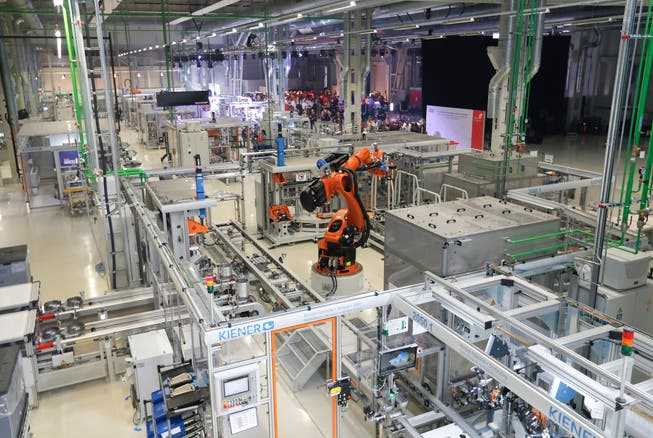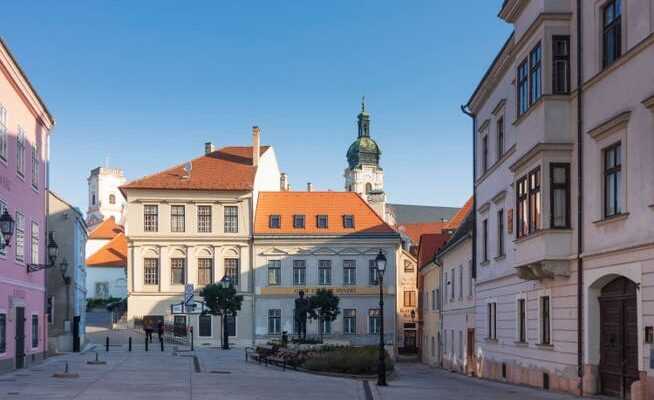A few days before the parliamentary elections, opponents of the Fidesz government are hoping to catch up. However, the two-thirds majority of Fidesz is in danger – because of tight races like in the Autostadt Györ.
The race for the seat of parliament in Hungary’s sixth largest city, Györ, is extremely close.
The opposition’s election campaign in Györ is over, but the big screen will remain in front of the Trianon monument until Sunday, monitored by two security guards. The music video for “A hatalom a népé” runs on it: The alliance of Orban opponents has chosen the catchy cover of Patti Smith’s “People Have the Power” as their anthem. The two of them are not particularly tense when they say that “probably paid” vandals tried several times to turn off the electricity.
Most people pay little attention to the status, although the song encourages some to listen. But the opposition needs all of its attention if it wants to endanger the ruling party Fidesz in the last few days. The big appearance of the top candidate Peter Marki-Zay the day before gave the campaign a boost, says the candidate of the six-party alliance in the constituency of Györ, Zita Jancso: “We feel the mood of change.”
Crucial two-thirds majority
A few days before the national parliamentary elections on Sunday, however, it is doubtful how strong the will of Hungarians is to vote out Prime Minister Viktor Orban, who has been in office for twelve years. The polls, while notoriously politicized, show consistently a slight lead for the government camp. The opposition, which is united for the first time, has succeeded in suppressing its internal tensions. But she is struggling with her weak program and an opponent who has significantly more resources and overwhelming media power over the outshining top candidate Orban.
Still at stake is Fidesz’s constitution-amending two-thirds majority of 133 seats in parliament, which gave democratic legitimacy to the build-up of this dominance. The analyst Adam Sanyo, operator the Tactical Voting website, sees only 67 mandates as relatively safe prey for Fidesz and 39 for the opposition. A third of the remaining 93 constituencies, including that of the city of Györ, are considered controversial. If Orban’s opponents want to have a say again after twelve years, they need victories in these tight races.
The seat in the sixth largest city of Györ is considered vulnerable because the Fidesz candidate Robert Balazs Simon secured his re-election in 2018 against a then fragmented opposition with less than half of the votes. The NZZ met the candidate in Györ for an interview. However, Simon subsequently withdrew all statements because he was dissatisfied with critical questions and only agreed to use it on condition that the article was adapted to his ideas. Attempts to mediate through contact persons at Fidesz failed.
The ruling party could be optimistic about this, as Simon is 7 percentage points ahead of his challenger in the polls. Fidesz, which also provides the mayor, can score points with the city’s economic dynamism, which thanks to the more than 12,000 jobs in the Audi car plant is quite wealthy and growing. “We not only need a city that is developing, but one that is also worth living in,” counters the locally well-established entrepreneur Jancso. She calls for solutions to the traffic problems and a decentralization of competences in education and health.
accusation of clientelism
Jancso and her comrade-in-arms Timea Glazer from the social-liberal Democratic Coalition party are trying to make national issues understandable for the local population. This includes the clientele economy in the environment of powerful Fidesz circles. “Like an octopus, these businessmen have their arms all over the city economy,” says Glazer. The practices in Györ mirrored those in the country on a small scale.
You are referring to it to the presumably targeted award of public projects to loyalists, as well as a scandal involving sex with a prostitute and insider trading in a land purchase that nearly cost the conservative mayor his re-election in 2019. He later resigned over the affair. That the prosecutor in January saw no basis for an indictment, the opposition sees as an indication of their politicization. The local Fidesz representatives react extremely thin-skinned to the issue and see the allegations as nothing more than a political attack.

Zita Jancso (right) and her colleague Timea Glazer from the social-liberal Democratic Coalition party.
Simon avoided direct confrontation in a debate during the election campaign – like Orban, who does not even publicly name his opponent. Fidesz can afford to do this because it relies on mobilizing its core constituency, which is much larger and more homogeneous than the opposition. The governing party also knows that by responding to their arguments, they would give their opponents a platform they would otherwise not have.
As a result, the campaigns play out in parallel public spheres. The grassroots democratically organized and at times cacophonous opposition mobilizes primarily via Facebook, campaigns on the streets and can count on the critical sympathy of some internet media. Fidesz spreads the messages set out by Orban and the party headquarters via public broadcasting, thousands of large-format posters and the several hundred media brought together in a foundation close to the government.
Distant election campaign
The Fidesz election campaign in Györ seems distant. Robert Balazs Simon speaks to the media about public safety, plays the first pass at a women’s soccer match and chats with a driver about new Volvo buses supplied through a central government investment programme. There are hardly any spontaneous events. Not even Orban’s visit, which underlines the importance of the district, was publicly announced in advance.

With over 12,000 jobs, the Audi plant in Györ is an indispensable economic factor.
Zita Jancso’s polemical assertion that she has to explain to many people that Simon is the local member of parliament does not seem entirely implausible. Most local Fidesz candidates remain pale, basking in the glory of the popular leader Orban, who promises continuity and stability, and are elected as his representative.
Also Simon’s political Statements on Facebook are largely Orban quotes: “Whoever votes for Fidesz votes for peace. Anyone who votes for the left votes for the war »is one of these core messages against the background of the Ukraine war. That the assertion that Marki-Zay would send Hungarian troops to the neighboring country after a victory lacks any real political basis and on a distorted spoken request It doesn’t matter: it’s about presenting the opposition, and with it a change of power, as an existential threat to Hungary – with Orban as the only anchor of security in stormy times.
